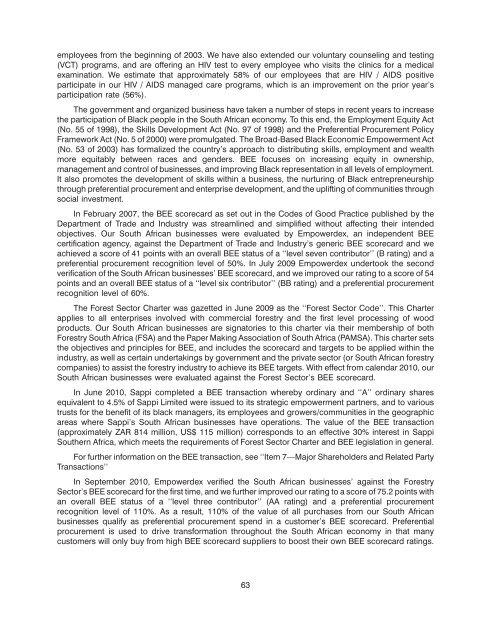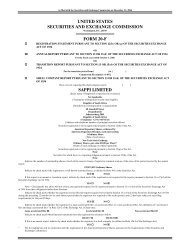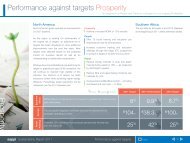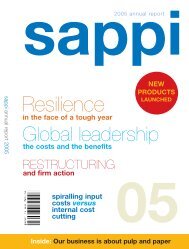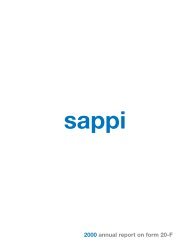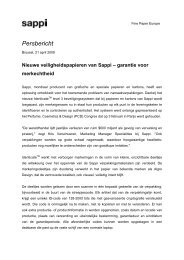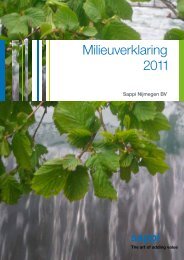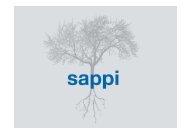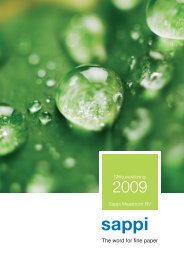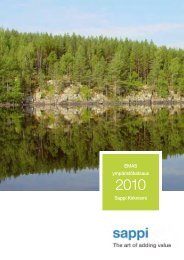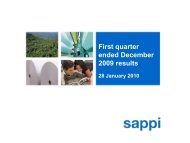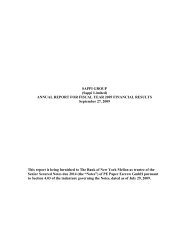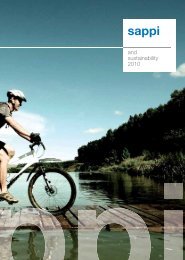You also want an ePaper? Increase the reach of your titles
YUMPU automatically turns print PDFs into web optimized ePapers that Google loves.
employees from the beginning of 2003. We have also extended our voluntary counseling and testing<br />
(VCT) programs, and are offering an HIV test to every employee who visits the clinics for a medical<br />
examination. We estimate that approximately 58% of our employees that are HIV / AIDS positive<br />
participate in our HIV / AIDS managed care programs, which is an improvement on the prior year’s<br />
participation rate (56%).<br />
The government and organized business have taken a number of steps in recent years to increase<br />
the participation of Black people in the South African economy. To this end, the Employment Equity Act<br />
(No. 55 of 1998), the Skills Development Act (No. 97 of 1998) and the Preferential Procurement Policy<br />
Framework Act (No. 5 of 2000) were promulgated. The Broad-Based Black Economic Empowerment Act<br />
(No. 53 of 2003) has formalized the country’s approach to distributing skills, employment and wealth<br />
more equitably between races and genders. BEE focuses on increasing equity in ownership,<br />
management and control of businesses, and improving Black representation in all levels of employment.<br />
It also promotes the development of skills within a business, the nurturing of Black entrepreneurship<br />
through preferential procurement and enterprise development, and the uplifting of communities through<br />
social investment.<br />
In February 2007, the BEE scorecard as set out in the Codes of Good Practice published by the<br />
Department of Trade and Industry was streamlined and simplified without affecting their intended<br />
objectives. Our South African businesses were evaluated by Empowerdex, an independent BEE<br />
certification agency, against the Department of Trade and Industry’s generic BEE scorecard and we<br />
achieved a score of 41 points with an overall BEE status of a ‘‘level seven contributor’’ (B rating) and a<br />
preferential procurement recognition level of 50%. In July 2009 Empowerdex undertook the second<br />
verification of the South African businesses’ BEE scorecard, and we improved our rating to a score of 54<br />
points and an overall BEE status of a ‘‘level six contributor’’ (BB rating) and a preferential procurement<br />
recognition level of 60%.<br />
The Forest Sector Charter was gazetted in June 2009 as the ‘‘Forest Sector Code’’. This Charter<br />
applies to all enterprises involved with commercial forestry and the first level processing of wood<br />
products. Our South African businesses are signatories to this charter via their membership of both<br />
Forestry South Africa (FSA) and the Paper Making Association of South Africa (PAMSA). This charter sets<br />
the objectives and principles for BEE, and includes the scorecard and targets to be applied within the<br />
industry, as well as certain undertakings by government and the private sector (or South African forestry<br />
companies) to assist the forestry industry to achieve its BEE targets. With effect from calendar 2010, our<br />
South African businesses were evaluated against the Forest Sector’s BEE scorecard.<br />
In June 2010, Sappi completed a BEE transaction whereby ordinary and ‘‘A’’ ordinary shares<br />
equivalent to 4.5% of Sappi Limited were issued to its strategic empowerment partners, and to various<br />
trusts for the benefit of its black managers, its employees and growers/communities in the geographic<br />
areas where Sappi’s South African businesses have operations. The value of the BEE transaction<br />
(approximately ZAR 814 million, US$ 115 million) corresponds to an effective 30% interest in Sappi<br />
Southern Africa, which meets the requirements of Forest Sector Charter and BEE legislation in general.<br />
For further information on the BEE transaction, see ‘‘Item 7—Major Shareholders and Related Party<br />
Transactions’’<br />
In September 2010, Empowerdex verified the South African businesses’ against the Forestry<br />
Sector’s BEE scorecard for the first time, and we further improved our rating to a score of 75.2 points with<br />
an overall BEE status of a ‘‘level three contributor’’ (AA rating) and a preferential procurement<br />
recognition level of 110%. As a result, 110% of the value of all purchases from our South African<br />
businesses qualify as preferential procurement spend in a customer’s BEE scorecard. Preferential<br />
procurement is used to drive transformation throughout the South African economy in that many<br />
customers will only buy from high BEE scorecard suppliers to boost their own BEE scorecard ratings.<br />
63


